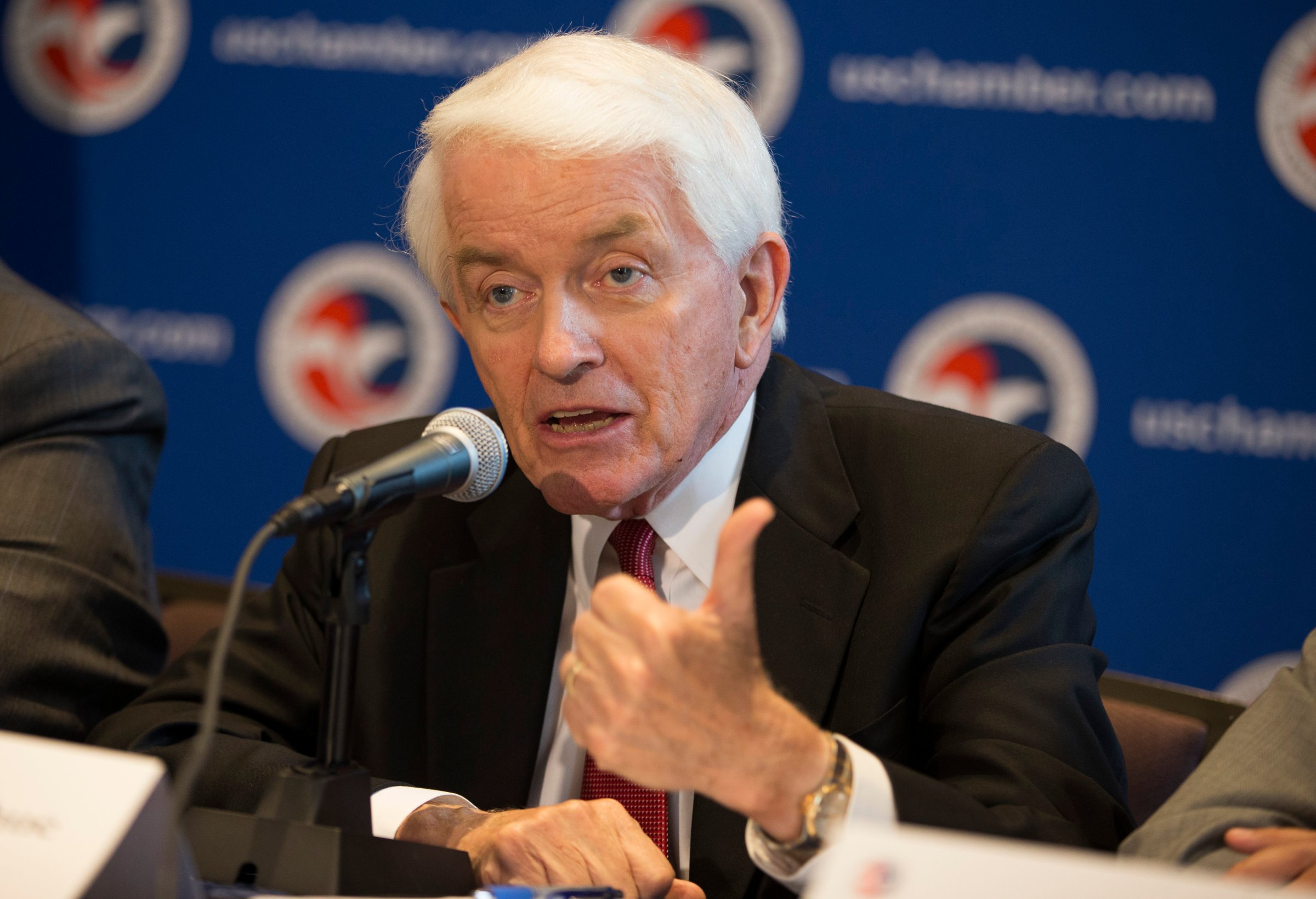
On the day after New Jersey and Virginia’s gubernatorial elections last fall, Mitch McConnell showed up at a board meeting of the U.S. Chamber of Commerce with another race on his mind. He announced that the day’s most consequential contest had been neither Chris Christie’s victory nor Ken Cuccinelli’s defeat. Instead, the Senate minority leader explained, it had been a GOP primary in South Alabama.
The Chamber had shelled out about $200,000 in the sleepy district on the Mississippi border to rescue a mainstream candidate who was struggling to fend off a Tea Party firebrand. The race had emerged as a test of whether the GOP could thwart a conservative insurgency that threatened to swallow it. Backed by the Chamber’s money and muscle, the establishment candidate eked out a victory. If it wasn’t for you, McConnell told the audience, according to two people present, it wouldn’t have happened.
The visit was both a token of institutional gratitude and a sign of things to come. Since last fall, the Chamber has cemented itself as the GOP Establishment’s heaviest hitter in the fight to reclaim the party from Tea Party zealotry. It has forked over about $15 million to boost business-friendly candidates in 2014 elections, more than any other Republican group. And it has amassed an undefeated record in nearly a dozen races so far, including key victories over candidates backed by the national outfits that powered the shutdown.
The Chamber’s formula has been simple. It has spent heavily in key races, worked with local partners who know the issues, and tapped celebrity endorsements to lift chosen candidates. “We’re looking for ways to break through,” says Scott Reed, the Chamber’s chief political strategist.
The business lobby’s involvement in GOP primary campaigns is something new, a shift sparked by frustration with conservative groups who supported the nomination of lackluster candidates and a succession of reckless fights. “For us, it was a different approach to take a big risk early in Alabama,” says Rob Engstrom, the Chamber’s national political director. “That could have had a disastrous effect.” From there, the Chamber has triumphed around the country, from a House race in Idaho against a candidate backed by the powerful Club for Growth to a Senate primary in Georgia whose field included two Tea Party favorites that could have tipped the general election to a Democrat.
Money has been a major ingredient. The Chamber poured $2.5 million into the Georgia primary, helping to usher its candidate, GOP Rep. Jack Kingston, into the runoff later this month. It spent some $500,000 on a single ad in the Idaho House GOP primary pitting Rep. Mike Simpson, a top ally of House Speaker John Boehner, against a Club-backed candidate. In all, the Chamber could spend up to $60 million in the 2014 cycle.
When needed, the group has brought in national figures to close the deal. In Simpson’s race in Idaho, that meant enlisting Mitt Romney, whose favorability rating in the district approaches 90%. In Florida, it meant a testimonial from popular former Gov. Jeb Bush.
Perhaps the best example of this approach came in last month in Mississippi. Strategists with the Chamber scrambled to find an edge after incumbent Sen. Thad Cochran was narrowly defeated in the Republican primary, barely squeaking into a runoff three weeks later against a conservative insurgent with momentum. Cochran’s ouster would have been vindication for national Tea Party groups and a boon to their fundraising efforts. As the Establishment fretted that the race was lost, the Chamber called a Hail Mary for a Magnolia State superstar.
On June 19, former University of Southern Mississippi quarterback and NFL MVP Brett Favre endorsed Cochran in a direct-to-camera television ad. “I’ve learned through football that strong leadership makes the difference between winning and losing,” Favre, sporting a salt-and-pepper beard, explained in the 30-second commercial. “Mississippi can win big with Thad Cochran.”
The ad went viral online, and in the final week of the race the Chamber spent $100,000 per day to air it across the state. The air cover helped Cochran eke out a win five days later by a little over 7,000 votes. As it happens, the original plan called for even more local firepower. The Chamber had hoped to team Favre with New York Giants QB Eli Manning, a former Ole Miss star, before Republican strategist Ari Fleischer, who advises NFL teams and players, nixed the idea. (Manning “is not political,” Fleischer wrote in an email to TIME. “It had nothing to do with the NFL.”)
Despite the electoral success, the Chamber has continued to struggle in the GOP-controlled house, where conservatives have been frustrating the group’s agenda on immigration reform and reauthorization of the Export-Import Bank. Some Democrats have seized on these setbacks, encouraging the Chamber to switch sides. Though officially nonpartisan, the number of Democrats endorsed by the Chamber has plunged from about three dozen in 2008 to just three only six years later.
“From the Export-Import bank to tax extenders to immigration reform, Democrats and business are on the same side on a range of issues,” Sen. Chuck Schumer, a New York Democrat, said in a statement to TIME. “The Tea Party has dragged the Republican Party so far to the right that business is now closer to mainstream Democrats than Republicans.”
Not as the Chamber sees it, however. “We might have a common view with them on Ex-Im,” says Engstrom, “but the Democratic Party has fundamentally walked away from us on the issues.”
More Must-Reads from TIME
- Donald Trump Is TIME's 2024 Person of the Year
- Why We Chose Trump as Person of the Year
- Is Intermittent Fasting Good or Bad for You?
- The 100 Must-Read Books of 2024
- The 20 Best Christmas TV Episodes
- Column: If Optimism Feels Ridiculous Now, Try Hope
- The Future of Climate Action Is Trade Policy
- Merle Bombardieri Is Helping People Make the Baby Decision
Write to Alex Altman at alex_altman@timemagazine.com